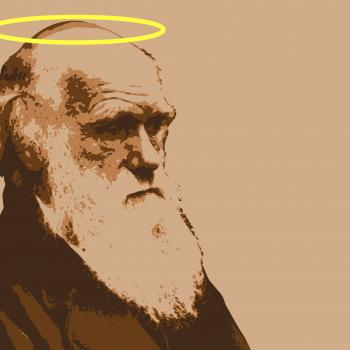Connor Wood
 To believe the hype around science and religion, you’d think that nearly all religious folks in the United States were sunlight-fearing science-haters. And in fact, most social scientists assume that conservative religious people reject all basic scientific methods of gaining knowledge, preferring instead to stick with Scripture and religious authority. But new research makes a different claim: according to John H. Evans of the University of California, San Diego, religious Americans accept science in general – and are often highly scientifically literate – but they distrust scientists in a few key areas where the theological stakes are high.
To believe the hype around science and religion, you’d think that nearly all religious folks in the United States were sunlight-fearing science-haters. And in fact, most social scientists assume that conservative religious people reject all basic scientific methods of gaining knowledge, preferring instead to stick with Scripture and religious authority. But new research makes a different claim: according to John H. Evans of the University of California, San Diego, religious Americans accept science in general – and are often highly scientifically literate – but they distrust scientists in a few key areas where the theological stakes are high.

For the past half-century, researchers have assumed that an overarching “epistemological conflict” was driving a wedge between religion and science in the public sphere. In this model, religion and science offered completely different strategies for building knowledge about the world, and most people probably either accepted one or the other. If you were a religious person, then, you were assumed to use the Bible or religious authority as your source for all knowledge, and you ignored or refused to accept science at all.
John H. Evans, a sociologist at UCSD, set out to test this model by gleaning data from the 2006 General Social Survey, a massive database of demographic and other information about a wide swath of the American public. He separated out groups of respondents according to their levels of religious commitment and the conservatism of their beliefs. This methodology distinguished between fundamentalist Protestants, evangelicals, mainline Protestants, African-American Protestants, conservative and liberal Catholics, and the non-religious.
According to Evans’s criteria, the non-religious were respondents who attended church a few times a year or less. This group, comprising 54% of the total population, functioned as the control group for the study. Religious respondents’ levels of scientific literacy were compared to those of the control group to determine the extent to which religious Americans accepted or rejected science.
Evans set about examining the data with three hypotheses in mind. First, conservative and African-American Protestants would be less scientifically literate, recognize fewer scientific facts, and generally trust science less than “ordinary” non-religious respondents. If this hypotheses were disproved, then Hypothesis II would be tested. This second hypothesis postulated that conservative religious respondents would tend to reject only those scientific claims that specifically contradicted important theological claims within their traditions. Finally, the third hypothesis, which was compatible with the second, predicted that conservative religious believers would distrust guidance from scientific leaders when it came to important moral debates such as stem cell research or global warming.
After controlling for important variables such as education level, income, age, ethnicity, and gender, Evans found that there was no evidence whatsoever to support the claim that religious believers rejected science across the board. In fact, he found that evangelic Protestants had actually taken more college-level science classes than the average non-religious respondent, and that mainline Protestants were more scientifically literate than ordinary Americans! Even conservative fundamentalist Protestants were no less likely to understand important scientific concepts and methods than non-religious Americans with comparable education levels.
Okay, so the “epistemological conflict” model didn’t seem to hold water after all. But what about the other two hypotheses? Were conservative religious believers less likely to trust science when it came to delicate, theologically important spheres such as evolution and the origin of the cosmos, or to accept scientific leadership in issues with high-visibility moral conflicts?
In a word, yes. While nearly all religious believers showed higher levels of general scientific literacy than might otherwise be expected, most religious groups rejected scientific teachings when those teachings contradicted specific theological claims made by their traditions. The most obvious example of this kind of conflict is in the question of human origins: the Judeo-Christian tradition teaches that humans were made intentionally by God, while Darwinism argues that humans are just another random product of evolution.
Interestingly, the only exception to this finding was mainstream or liberal Catholics, who accepted evolution just as gladly as did non-religious respondents. Mainline Protestants, on the other hand, expressed more distrust for evolution and similar claims than their liberal reputation might suggest.
Most religious respondents were also less likely to accept policy leadership from scientists when it came to global warming or stem cell research, but were happy to accept scientific leadership in the field of genetically modified crops. Evans interpreted these findings to mean that conservative religious believers were happy to accept scientific influence and leadership in spheres that did not have a specific moral component – Evans assumed that genetically modified food wasn’t a moral issue in the United States, unlike in most parts of Europe – but were skittish about scientists’ having too much sway in subjects that had moral or theological importance.
The results of Evans’s study make an important point: most religious Americans are not anti-science, at least not in the vast majority of cases. Almost nobody denies scientific teachings on photosynthesis, Evans claims, since religious teachings don’t have anything to say about photosynthesis one way or another. It’s only in a very limited, specific areas that scientific claims directly contradict important theological claims. Notably, these areas often have important moral overtones. For instance, many Protestant opponents of evolution – including William Jennings Brian of the Scopes monkey trial – have objected to Darwinism not because of the scientific methods used to develop Darwinian theory, but because the random, blind, and apparently senseless nature of evolution seemed destined to lead to moral relativism and selfishness among students who learned about it.
Bryan and his followers – then as well as today – may have been mistaken about the effects of teaching evolution to students. But Evans’s research shows that, at the very least, there is an intelligible, understandable pattern within conservative Protestants’ conflicts with science. Conservative religious Americans trust science in general, but that trust dries up when it comes to a few, theologically sensitive areas.
It may, ultimately, come down to what sort of world people want to live in. Claiming that photosynthesis happens doesn’t make the world seem like a darker place. But claiming that the heartless machinery of evolution is the only truth to life on Earth certainly has overtones of darkness, at least for many people. Perhaps scientists would do well to keep in mind that truths are not simply abstract entities. They’re also living elements of the stories we tell ourselves daily about the world we live in – and some truths are friendlier than others.











